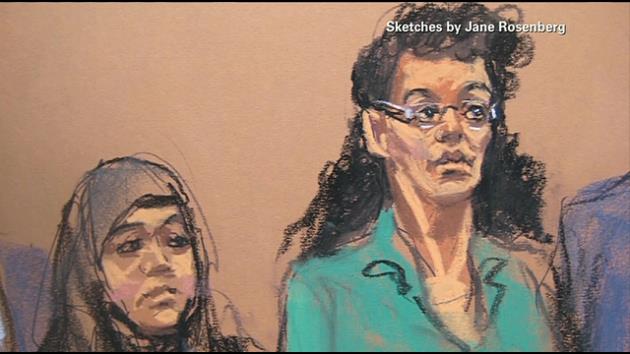By TOM HAYS
Associated Press
NEW YORK (AP) — The disturbing allegations were contained in court papers describing the latest homegrown terror plot thwarted by the FBI and the New York Police Department.
Noelle Velentzas and Asia Siddiqui were arrested at their Queens homes early Thursday following a sting operation using an undercover officer wearing a wire. Officer searching the homes recovered items including three gas tanks, a pressure cooker, fertilizer, handwritten notes on the recipes for bomb making and jihadist literature, court papers say.
Velentzas, had been “obsessed with pressure cookers since the Boston Marathon attacks in 2013” and made jokes alluding to explosives after receiving one as a gift, according to a criminal complaint citing one of the secret recordings made by the undercover who managed to befriend the pair.
The arrests show U.S. authorities “are committed to doing everything in our ability to detect, disrupt, and deter attacks by homegrown violent extremists,” U.S. Attorney Loretta Lynch said in a statement. “As alleged, the defendants in this case carefully studied how to construct an explosive device to launch an attack on the homeland.”
The women were held without bail after a brief court appearance where they spoke only to say they understood the charges against them. Velentzas, 28, wore a hijab and a dark dress, and Siddiqui, 31, had on a green T-shirt with a long-sleeved black shirt underneath and a dark long skirt.
“My client will enter a plea of not guilty, if and when there is an indictment. I know it’s a serious case but we’re going to fight it out in court,” said Siddiqui’s lawyer, Thomas Dunn. Velentzas’ attorney had no comment.
The complaint cites a poem written by Siddiqui that appeared in a magazine published by al-Qaida in the Arabian Peninsula that declared there is “no excuse to sit back and wait — for the skies rain martyrdom,” investigators wrote in court papers. Velentzas called bin Laden one of her heroes, and said she and Siddiqui were “citizens of the Islamic State,” they said.
According to the complaint, the women “researched and acquired some of the components of a car bomb, like the one used in the 1993 World Trade Center bombing; a fertilizer bomb, like the one used in the 1995 bombing of the federal building in Oklahoma City; and a pressure cooker bomb, like the one used in the 2013 Boston Marathon bombing,” authorities wrote.
After two New York City police officers were gunned down in a patrol car in December, Velentzas told the undercover officer that the deaths showed it was easy to kill a police officer, according to the complaint. After the undercover officer mentioned that 25,000 officers had turned out for the first of the funerals for the two officers, Velentzas “complimented” the officer for coming up with an attractive target and considered whether the other funeral was an appropriate target, it added.
The complaints suggests that authorities decided to make the arrests after Siddiqui came into “possession of multiple propane gas tanks, as well as instructions for how to transform propane tanks into explosive devices,” and told the undercover she was “disinclined” to talk about her plans.
“It is very, very important to note: there was never any imminent threat to our fellow New Yorkers,” Mayor Bill de Blasio said when asked about the case. The plot, he added, “was undercut before it could turn into something dangerous.”
Neighbors of Siddiqui said she and her brother lived in the basement of a red-brick three floor house, owned by their parents, who didn’t live there.
“She was quiet, and I never thought she could do this,” said Mohammad Shahidul Haque, a retired hospital lab tech.
The arrests came the same day as another U.S. citizen was brought from Pakistan to New York to face charges he supported a conspiracy to kill Americans. Muhanad Mahmoud Al Farekh appeared Thursday in Brooklyn federal court and was held without bail.
Al Farekh, who was born in Texas, and two other co-conspirators were students at the University of Manitoba in Winnipeg, Canada, in 2007 when authorities say they started watching al-Qaida propaganda and hatching a plan to become martyrs abroad, an FBI agent wrote in a January complaint.
Al Farekh and the two others flew to Karachi, Pakistan, on round-trip tickets in March 2007 after selling their belongings, disconnecting their phones and buying mountain boots that authorities say are commonly worn by al-Qaida fighters in Pakistan and Afghanistan, the complaint says.
His lawyer did not comment.
Copyright 2015 The Associated Press. All rights reserved. This material may not be published, broadcast, rewritten or redistributed.

